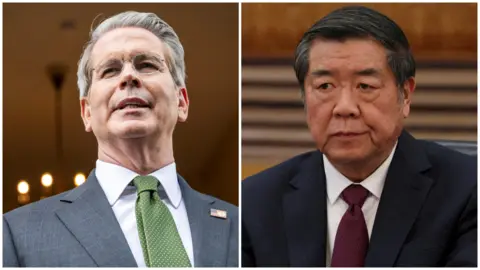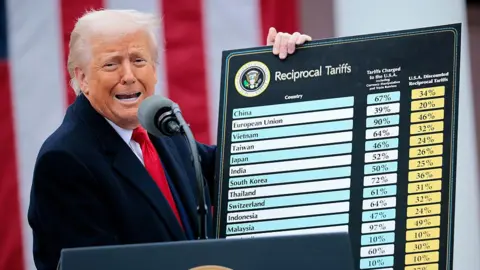US says 'deal' reached with China after trade talks
 BBC
BBCBoth China and the United States have said that they've made progress at trade talks between the two countries in Switzerland.
The US Treasury Secretary Scott Bessent described the discussions as "productive and constructive," while China's Vice Premier He Lifeng said the talks were "in-depth" and "candid".
The White House called it a "trade deal" but gave no further details. A joint statement with full details is expected on Monday.
The pair were engaged in secretive closed-door discussions all weekend, in the first meeting since US President Donald Trump levied steep tariffs against China in January.
The talks were the first face-to-face meetings between the two countries since President Trump imposed a 145% tariff on Chinese imports, with Beijing responding with a 125% levy some US goods.
The huge tariffs caused turmoil in the financial markets and sparked fears of a global recession.
Stocks in mainland China and Hong Kong were making gains on Monday morning. The Shanghai Composite Index was around 0.4% higher, while the Hang Seng was up by almost 0.7%.
US stock futures were sharply higher. Futures are contracts to buy or sell an underlying asset at a future date and are an indication of how markets will trade when they open.
The Chinese currency, the yuan, also strengthened against the US dollar.
One trade expert told the BBC's Business Today programme that the announcement may include cuts to their tariffs.
Frank Lavin, former undersecretary for international trade at the US Department of Commerce, said he expects the two countries to cut tariffs although they would remain "way above historical norms".
But Deborah Elms, Head of Trade Policy at the Hinrich Foundation, was less optimistic.
The so-called reciprocal tariffs "could be addressed, but probably not. I think mostly what I expect is an agreement to keep talking," she said on the BBC's Newsday programme.
Following the conclusion of the two-day talks in Geneva, US trade representative ambassador Jamieson Greer said "the deal we struck with our Chinese partners" would help reduce the US's $1.2tn (£901bn) trade deficit.
Bessent said the US and China have made "substantial progress" on de-escalating the trade war, while Vice Premier He said the talks were "of great significance to the two countries but also have an important impact on the stability and development of the global economy".
Vice Premier He said the two sides have reached a series of major consensuses, and had also agreed to establish an economic and trade consultation mechanism.
Ngozi Okonjo-Iweala, inspector general of the World Trade Organization, called the talks "a significant step forward."
"I urge both nations to build on this momentum by continuing to develop practical solutions that mitigate tensions, restore predictability, and strengthen confidence in the multilateral trading system," she said in a statement.
On Saturday, following the first day of talks Trump praised the "total reset" on the relationship between the two countries.
 Getty Images
Getty ImagesIn a social media post, the US president described the talks as being "very good" and said change had been "negotiated in a friendly, but constructive, manner".
"We want to see, for the good of both China and the U.S., an opening up of China to American business. GREAT PROGRESS MADE!!!" Trump added.
An escalating trade war between Washington and Beijing has seen the US president hit Chinese imports to the US with tariffs of 145%. China retaliated with levies of 125% on some US goods.
On Friday, before the talks began, White House Press Secretary Karoline Leavitt said Washington would not lower tariffs unilaterally, and China would need to make its own concessions.
Both sides issued various other warnings ahead of the meeting, with Beijing saying the US must ease tariffs while Bessent stressed that the focus was on "de-escalation" and this was not a "big trade deal".
Chinese state media reported that Beijing had decided to engage with the US after fully considering global expectations, the country's interests and appeals from American businesses.
Last month, the BBC found that Chinese exporters were struggling with the US's tariffs - one company, Sorbo Technology, reported that half of its products were normally sold to the US and were now sat in boxes in a warehouse in China.
Meanwhile, the US economy was found to have shrunk in the first three months of the year - contracting at an annual rate of 0.3% - as firms raced to get goods into the country.
The trade war between China and the US intensified last month after President Trump announced a universal baseline tariff on all imports to the United States, on what he called "Liberation Day".
Around 60 trading partners, which the White House described as the "worst offenders", were subjected to higher rates than others. The list included China and the European Union.
Trump said this was payback for years worth of unfair trade policies for the US.
He also separately announced a 25% import tax on all steel and aluminium coming into the US, and a further 25% tariff on all cars and car parts.
It was announced last week that the US and UK had agreed a deal, in which the 25% will be cut to 10% for a maximum of 100,000 UK cars - matching the number of cars the UK exported last year.
Cars are the UK's biggest export to the US, worth about £9bn last year.
